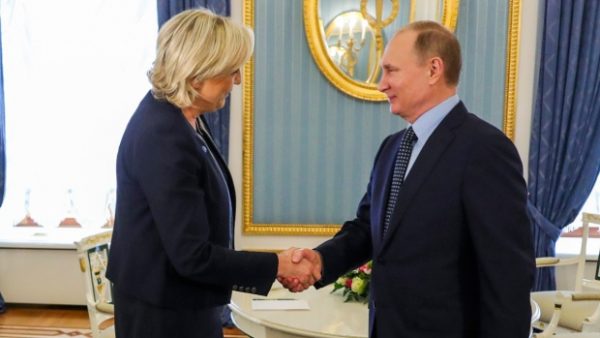
By Joe Scarborough
Russia has struck again. But this time, Vladimir Putin’s target was not a presidential runner-up in the United States but the next president of France.
Putin should have quit while he was behind.
Russia’s attack on last year’s American election may have dominated political headlines, but many agree with Democratic legend Willie Brown that “the Russians didn’t lose the election for Clinton. It was our own overconfidence.”
Whether Brown is right or not, this much is certain. Russia’s foreign electioneering is not the Machiavellian masterstroke that Putin’s admirers claim it up to be. Instead, Russia’s reckless gambit into U.S. politics has created a diplomatic backlash that has left Moscow more isolated than before Donald Trump’s election.
WikiLeaks’ targeting of the Democratic Party added to the growing list of Russian-themed scandals that had engulfed Trump World over the past year. That, in turn, has resulted in Russia’s relationship with the United States being at its worst since the end of the Cold War. The Economist has written of “a sharp deterioration in relations between the two countries since Donald Trump became president.” And last month, Secretary of State Rex Tillerson told reporters in Moscow that the two nuclear powers’ relationship is experiencing a “low point.”
Putin’s reckless strategy backfired so badly that it may have permanently deprived him of the prize he most sought: the ending of American sanctions. Within days of Trump’s inauguration as the 45th president, John McCain and a group of other GOP senators loudly declared that they would do whatever was required to stop the new president from easing Russian sanctions.
McCain explained his decision by describing how the Kremlin was intensifying “its propaganda efforts to undermine the governments of our allies … and deliberately interfere in our recent election with cyberattacks and a disinformation campaign designed to weaken America.”
A slew of Republican heavyweights joined with McCain in warning Trump not to lift the Russian sanctions, with Senate Majority Leader Mitch McConnell, House Speaker Paul D. Ryan, Ohio Sen. Rob Portman and Arkansas Sen. Tom Cotton adding their own public pressure on the president.
The scale of Putin’s failures went far beyond his inability to gain sanctions relief from his obsequious White House friend. The new American president made matters worse for Moscow by ordering a military strike on Russia’s Syrian ally. The once pliable American president is now giving Moscow such fits that the relationship between Washington and Moscow has been radically altered, according to the Atlantic’s Julia Ioffe.
“Vladimir Putin had spent the last three years establishing a dynamic in which Putin acts and Washington, gobsmacked, scrambles to react.” Post-Syria, Ioffe writes, it is Russia struggling to find a proper response to an unpredictable American president.

Even now, Russia is struggling to find its diplomatic footing. Putin’s recent peace push in Syria has all the markings of leader back on his heels. The Post’s David Ignatius reported that diplomats explained Putin’s Syrian machinations this way: “The Russians were worried by Trump’s authorization of a cruise missile strike on a Syrian air base after last month’s chemical weapons attack. And they were concerned, more broadly, about the deteriorating state of U.S.-Russian relations under a Trump administration they had hoped would bring an easing of tensions.”
Ignatius’s conclusion? Putin is still a cynical opportunist. “But for a change, he’s the one pursuing a Syria deal, while the United States bides its time.”
Putin’s failures do not mitigate the reality that he tried to subvert American democracy and steal a presidential election. Nor do they make the Senate Intelligence Committee’s investigation into Trump/Russian ties any less urgent. But understanding how Putin badly overplayed his hand in the United States should provide insight into how foolish the Russian autocrat is to make enemies with the soon-to-be-elected president of France.
British journalist Ben Judah reported that several sources inside Emmanuel Macron’s campaign have stated that “the Russian attack” has dramatically hardened Macron’s views toward Putin and Russia. But even as early as March, Bloomberg was reporting that Putin’s gambits to influence France’s election “look likely to backfire.” Macron’s victory over Marine Le Pen will only make the Russian leader’s foreign electioneering seem more feckless and shortsighted.
Foreign-policy analysts should consider taking a closer look at Putin and begin to question whether he is the brilliant Bond villain many make him out to be, or whether Russia’s president-for-life is more of a political gadfly whose foreign meddling ends up causing more damage to Russia’s long-term interests than any country he targets.
WASHINGTON POST

Leave a Reply
You must be logged in to post a comment.